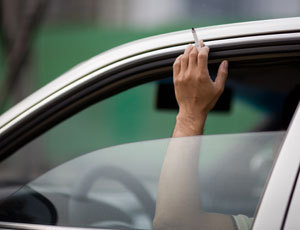 It’s tempting to respond to the BMA’s extraordinary proposal to ban smoking in cars with
a Thin End of the Wedge argument. Ban smoking even on the part of an unaccompanied adult, sitting in a car by the side of the road? How long before they’re banning it in the home, eh? But hold it
right there. The proposal isn’t just scary for where it might lead. It’s scary all by itself. The notion that a grown up can be barred from self-harm by smoking a fag by himself, in his own car,
his own space, on the basis that it might kill him sooner rather than later, should be unthinkable in a free society.
It’s tempting to respond to the BMA’s extraordinary proposal to ban smoking in cars with
a Thin End of the Wedge argument. Ban smoking even on the part of an unaccompanied adult, sitting in a car by the side of the road? How long before they’re banning it in the home, eh? But hold it
right there. The proposal isn’t just scary for where it might lead. It’s scary all by itself. The notion that a grown up can be barred from self-harm by smoking a fag by himself, in his own car,
his own space, on the basis that it might kill him sooner rather than later, should be unthinkable in a free society.
Normally, this sort of authoritarianism is justified on the basis of what it might do to the kiddies – and indeed, the Welsh and Scottish assemblies are pondering whether to ban smoking in cars in which a child is travelling, as South Africa has already done – or to non-smokers, such as the 2007 ban on smoking in public places. But this time, the authoritarianism is upfront. Because toxin concentration is as much as 23 times greater in a car as in a smoky bar, smokers will be more vulnerable to harm – and therefore should be protected from the risk. Or, as Dr Vivienne Nathanson, head of science at the BMA puts it, ‘the evidence for extending smoke-free legislation is compelling’. So compelling indeed, that the Northern Ireland Assembly’s Health Minister, Edwin Poots, has said he’s considering a ban on all smoking in cars, not just those with children.
There is indeed a compelling case for letting smokers know that levels of toxins are as high as this in a car. And then for leaving them to work out the consequences. This grisly syllogism – smoking is harmful; smoking in cars is more harmful still; therefore smoking in cars must be banned – suggests a degree of hostility to personal freedom on the part of intelligent professionals which ought to rally non-smokers right behind the smokers. It shouldn’t be necessary even to say this, but our freedoms as grown ups ought to include the freedom to engage in activities which may do us harm or shorten our lives, like drinking too much or overeating fatty food or having sex with strangers. Though as David Hockney, that exile from authoritarian, no-smoking England, points out in his tireless campaign against the smoking ban, Dennis Thatcher died at the age of 88 after a lifetime of smoking unfiltered Senior Service fags, and Deng Xiaoping, who died at 92, was never photographed without a Panda cigarette.
If the BMA does fancy calling for people to be prosecuted for engaging in activities that might do them harm, well, there’s no shortage of targets. Nearly 650,000 people contracted sexually-transmitted disease in 2010, including those, like Chlamydia, that can permanently damage your fertility or syphilis, which may be transferred from a carrier mother to a foetus. But if the BMA is campaigning against promiscuity, for a law against serial sexual relations which by definition increase your chances of catching genital herpes, why, I’ve missed it. I’d maintain myself that driving a car is more dangerous than smoking in it. 1850 people died in car accidents last year; the number of casualties amounted to 208,648, quite possibly far more than the number of smoking-related disease contracted in cars.
I’m a rubbish smoker, myself. I hardly ever try and when I do try I never inhale; I just enjoy the sensation. Further, I really hate people who smoke in cars – it makes my hair smell. But there is, in a civilised society, a difference between disapproving of an activity and prosecuting people who engage in it. There is so much control freakery around smoking, it’s easy to dismiss this as just another attempt to push the boundaries. But this attempt to ban private pleasures is not just a slippery slope. It’s proof we’re well on the way to the bottom.







Comments